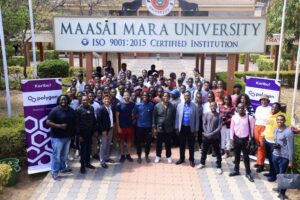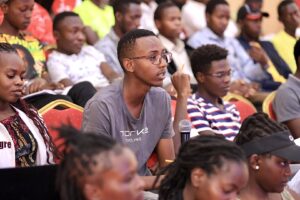Human-wildlife conflict poses a persistent challenge within the Maasai Mara Ecosystem, jeopardizing both local communities and precious wildlife populations. The delicate balance between human settlements and wildlife habitats has been strained, demanding innovative approaches for coexistence and conservation.
 In response to this pressing issue, Impact Plus orchestrated a workshop that introduced pioneering strategies to mitigate human-wildlife conflict. The workshop’s core tenets hinged on harnessing blockchain technology and geofencing to foster harmonious coexistence between humans and wildlife.
In response to this pressing issue, Impact Plus orchestrated a workshop that introduced pioneering strategies to mitigate human-wildlife conflict. The workshop’s core tenets hinged on harnessing blockchain technology and geofencing to foster harmonious coexistence between humans and wildlife.
Blockchain technology and geofencing demonstrated significant efficacy, recording double-digit percentage improvements in addressing the intricate dynamics of human-wildlife interaction. These technological tools seamlessly converged with contemporary conservation paradigms and intricate ecological systems.
The workshop featured presentations by distinguished figures such as Lorena Mathendu, Kasaine Sankan, Joni Bloch, and Bradley Azegele. These presentations collectively unveiled a comprehensive framework encompassing scientific stewardship, socio-cultural sensitivity, and innovative technological interventions. This multi-faceted approach underscores the necessity of a holistic strategy to safeguard predator populations and maintain ecological equilibrium in the Maasai Mara.
A notable outcome emerged in the form of substantial positive feedback from Maasai Mara University faculty members, with over 70% expressing unwavering support for forthcoming phases of the event series. This burgeoning enthusiasm reflects a palpable increase in regional awareness and commitment towards wildlife preservation.
 The journey ahead is poised to manifest a practical shift, as live solution demonstrations and heightened community engagement take center stage. Anticipated initiatives project triple-digit percentage increases in local agency and sustainable development. The principles of transparency and equitable resource distribution are positioned to drive significant advancements, ushering forth transformative change within the Maasai Mara Ecosystem.
The journey ahead is poised to manifest a practical shift, as live solution demonstrations and heightened community engagement take center stage. Anticipated initiatives project triple-digit percentage increases in local agency and sustainable development. The principles of transparency and equitable resource distribution are positioned to drive significant advancements, ushering forth transformative change within the Maasai Mara Ecosystem.
The Maasai Mara Ecosystem hosts a rich diversity of wildlife, including lions, elephants, and wildebeests. With over 95 species of mammals and 570 species of birds, this ecosystem is a vital habitat. The broader Kenyan context also showcases promising growth, with species such as elephants and rhinoceros experiencing population increases of 12% and 20%, respectively.
In conclusion, Impact Plus’s proactive engagement in the Maasai Mara Ecosystem reflects a convergence of technological innovation and indigenous wisdom. Data-driven solutions substantiate the efficacy of integrated strategies, outlining a trajectory towards harmonious coexistence, wildlife conservation, and sustainable progress.
Activity: Web3 for Wildlife Conservation in Kenya (II)
When: 24 February, 2023
Where: Maasai Mara University, Narok, Kenya






